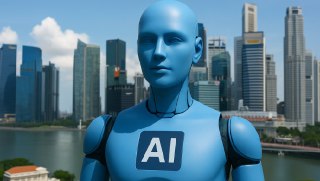Singapore Leads the World in AI Job Opportunities: 1 in 6 Roles Now Focus on AI!
Singapore’s AI Hiring Surge: A Glimpse into the Future
In a remarkable shift, Singapore has become a leader in the global artificial intelligence (AI) hiring landscape. Recent data from Indeed reveals that in August, the nation topped the charts with one in every six job postings referencing AI technologies. This trend underscores a broader movement towards the integration of advanced AI tools in various industries, paving the way for transformative changes in the workplace. But what does this mean for the future of business and employment in Singapore and beyond?
The Rise of AI in Job Postings
As AI technologies such as machine learning, generative AI, and agentic AI become increasingly prevalent, organizations are recognizing the need for a workforce equipped with the skills to leverage these innovations. The fact that such a significant portion of job postings now mentions AI reflects not only its immediate relevance but also its anticipated role in shaping future job requirements.
Future Possibilities: Scenarios to Consider
- Scenario 1: Worker Skill Transformation
- Scenario 2: The Role of AI in Recruitment
- Scenario 3: Enhanced Business Decision-Making
- Scenario 4: Ethical Considerations and Workforce Balance
As the demand for AI skills rises, educational institutions may prioritize AI literacy in their curricula. This shift could lead to a generation of workers who are proficient in integrating AI into traditional job roles, thereby enhancing productivity across sectors.
Imagine a future where AI not only shapes job postings but also optimizes recruitment processes. AI algorithms could analyze candidate resumes and match them with job descriptions, significantly reducing hiring time and improving candidate fit.
With AI tools capable of data analysis and predictive modeling, businesses could make more informed decisions. This capacity might lead to quicker adaptations to market changes, ultimately enhancing competitiveness and growth.
As AI continues to permeate workplaces, ethical considerations regarding privacy and job displacement will necessitate ongoing dialogue. Companies will need to balance AI integration with the human element of business to maintain trust and morale.
Implications for Businesses
The integration of AI within the workforce offers significant benefits for businesses, such as:
- Increased Efficiency: AI tools can automate repetitive tasks, allowing employees to focus on more strategic initiatives.
- Cost Reduction: Streamlining processes through AI can lead to lower operational costs over time.
- Enhanced Decision-Making: AI can analyze vast amounts of data, providing insights that facilitate better strategic decisions.
ROI Examples and Actions for Implementation
For businesses considering the adoption of AI, the following examples highlight potential ROI:
- Example 1: Customer Service Automation – Companies implementing AI chatbots have seen a reduction in customer service costs by up to 30%, with improved customer satisfaction rates.
- Example 2: Predictive Analytics – Firms using AI for predictive analytics report an average increase in sales of 10-15%, thanks to better-targeted marketing efforts.
To implement these benefits, businesses should consider the following actions:
- Conduct an AI readiness assessment to identify current capabilities and gaps.
- Invest in employee training programs focused on AI tools and applications.
- Collaborate with AI vendors or partners to integrate solutions that fit specific business needs.
Conclusion
As Singapore leads the charge in AI hiring, the future of work appears poised for transformative change. By embracing AI technologies, businesses can enhance efficiencies, streamline operations, and improve decision-making processes. The journey begins now; seize the opportunity to stay ahead of the curve.
Interested in learning how AI can benefit your business? Schedule a consultation with our team today and explore tailored solutions that can help you thrive in the era of AI.


